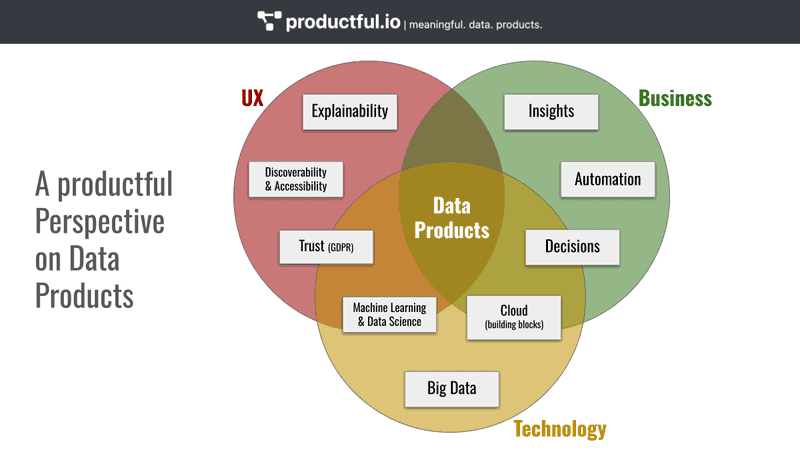Author: Paul
(3 min reading)
A productful Perspective on Data Products

The Three Dimensions of Data Products: User Experience, Business Value, and Technology
In the age of data-driven innovation, data products represent the intersection of user needs, business goals, and cutting-edge technology. These products, ranging from recommendation engines to predictive analytics platforms, must harmonize three critical dimensions: User Experience (UX), Business Value, and Technology. Addressing these dimensions holistically ensures data products are impactful, sustainable, and widely adopted.
- User Experience: Explainability, Discoverability, and Trust The success of any data product hinges on its ability to be accessible and understandable for its users. This means fostering trust through clear, intuitive, and human-centric design.
Explainability: Users must grasp how insights are derived. For example, in a machine learning-based credit scoring product, transparency about decision criteria builds trust. Visualizations, plain-language summaries, and "why" explanations should demystify complex algorithms. Discoverability and Accessibility: A seamless UX ensures that users can easily find and interact with the data they need. Data dashboards, search tools, and APIs should prioritize simplicity and responsiveness. For instance, embedding powerful yet intuitive tools within familiar cloud-based ecosystems makes them accessible to diverse users. Trust and GDPR Compliance: Regulatory adherence is foundational. Features like data anonymization, consent management, and clear data usage explanations instill user confidence. A GDPR-compliant platform not only meets legal requirements but also signals a commitment to ethical practices, enhancing credibility.
- Business Value: Insights, Automation, and Decision-Making At its core, a data product must deliver measurable business value, transforming raw data into actionable insights that drive outcomes.
Insights: Modern businesses demand real-time, actionable intelligence. A well-designed product leverages big data and machine learning to identify patterns, forecast trends, and uncover opportunities. For example, predictive models in e-commerce can anticipate customer demand, optimizing inventory. Automation: Reducing manual effort is critical for scalability. Automation powered by data science turns mundane tasks into streamlined processes. Consider a fraud detection system that autonomously flags suspicious transactions, allowing businesses to act swiftly.
Decisions: A data product is incomplete unless it supports informed decision-making. By integrating machine learning algorithms, businesses can transition from reactive to proactive strategies, such as using prescriptive analytics to recommend the best course of action.
- Technology: Big Data, Machine Learning, and Cloud Building Blocks Behind every successful data product lies a robust technological foundation that supports scalability, efficiency, and innovation.
Big Data: Data products must handle vast and diverse datasets, often in real-time. Frameworks like Apache Spark or cloud-native solutions enable scalable processing. These tools form the backbone for deriving insights across industries.
Machine Learning and Data Science: Intelligent algorithms are the brains of data products. Building, deploying, and refining models is crucial for delivering relevant predictions, recommendations, or categorizations. Tools like TensorFlow and pre-trained models in the cloud accelerate development.
Cloud Building Blocks: Cloud platforms like AWS, Azure, or GCP provide flexible infrastructure. Services for storage, compute, and analytics enable organizations to focus on innovation rather than operational complexity. For instance, managed machine learning services streamline experimentation and deployment.
Creating impactful data products requires balancing user experience, business value, and technology. Explainability, accessibility, and trust are essential for user adoption, while insights, automation, and decision-making drive business outcomes. Big data, machine learning, and cloud building blocks provide the foundation for scalability and efficiency. By excelling across these dimensions, organizations can craft data products that empower users, deliver value, and lead in a data-driven world.